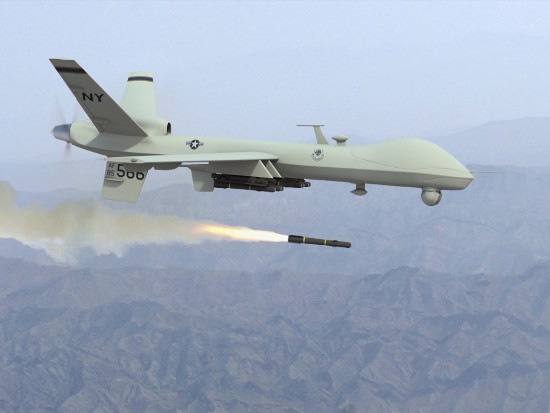
Over at The Weekly Standard, I noted that the proposal to rely on counterterrorism techniques, specifically Predator/Reaper strikes, to take out al Qaeda’s senior leadership in Pakistan in lieu of a counterinsurgency program to defeat the Taliban in Afghanistan, is seriously flawed. The proponents of this strategy make the assumption that al Qaeda and the Taliban don’t operate closely. But as Taliban / Haqqani Network commander Mullah Sangeen Zadran noted in a recent interview with As Sahab, al Qaeda’s propaganda arm, the Taliban and al Qaeda work together nearly seamlessly toward the same goals – defeating the US and her allies and re-installing the Mullah Omar-led Taliban government.
This reality is recognized in General McChrystal’s report, which was leaked to The Washington Post. From the “External Influences” section on Pakistan, the report identified that the Haqqani Network’s relationship with al Qaeda would permit the latter to reorganize in Afghanistan (emphasis below is mine):
Pakistan. Afghanistan’s insurgency is clearly supported from Pakistan. Senior leaders of the major Afghan insurgent groups are based in Pakistan, are linked with al Qaeda and other violent extremist groups, and are reportedly aided by some elements of Pakistan’s ISI. Al Qaeda and associated movements (AQAM) based in Pakistan channel foreign fighters, suicide bombers, and technical assistance into Afghanistan, and offer ideological motivation, training, and financial support. Al Qaeda’s links with HQN [Haqqani Network] have grown, suggesting that expanded HQN control could create a favorable environment for AQAM to re-establish safe-havens in Afghanistan. Additionally, the ISAF mission in Afghanistan is reliant on ground supply routes through Pakistan that remain vulnerable to these threats.
Stability in Pakistan is essential, not only in its own right, but also to enable progress in Afghanistan. While the existence of safe havens in Pakistan does not guarantee ISAF failure, Afghanistan does require Pakistani cooperation and action against violent militancy, particularly against those groups active in Afghanistan.
So if the Taliban and the Haqqani Network are allowed to expand their control in Afghanistan because US forces pull back to conduct over-the-horizon strikes, al Qaeda’s potential to expand its safe havens increases dramatically. Al Qaeda maintained numerous bases in Afghanistan before the US invasion of Afghanistan, with the approval of the Taliban. Why would we think that if we walked away and handed the Taliban a victory that they’d no longer welcome al Qaeda, who has aided them the past eight years?
Are you a dedicated reader of FDD's Long War Journal? Has our research benefitted you or your team over the years? Support our independent reporting and analysis today by considering a one-time or monthly donation. Thanks for reading! You can make a tax-deductible donation here.








2 Comments
I agree with your points, it would be a huge mistake if Washington gives up on the COIN operations. We can’t just rely on Predators. Ahmad Shah Massoud said long before 9/11 “There is no difference between the Taliban and Al Qaeda”
AQ and Taliban ARE ONE AND THE SAME THING. Even the NWFP Police Chief was frank about that in recent interviews in London, and he should know.
Bill thank you for highlighting that Pakistan section again